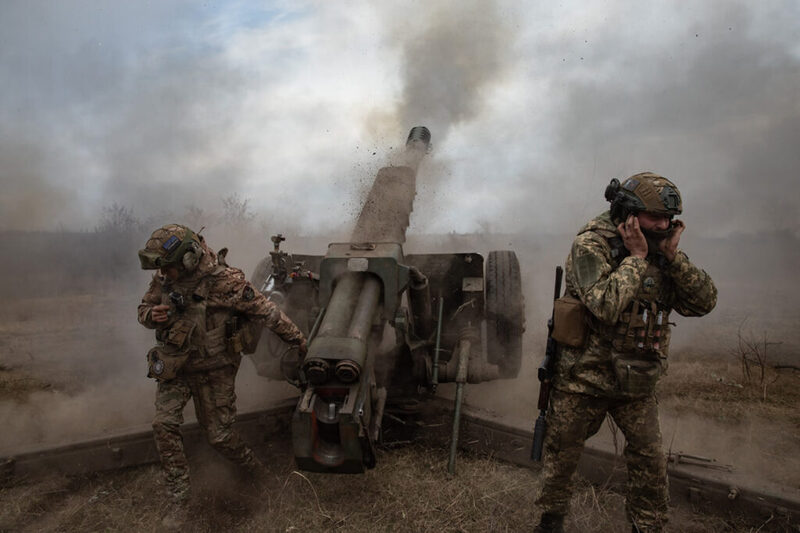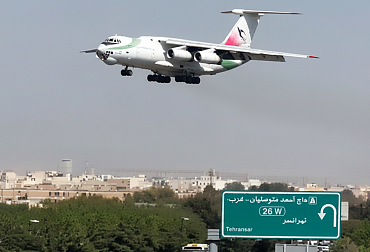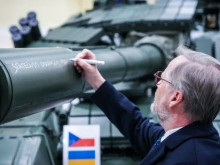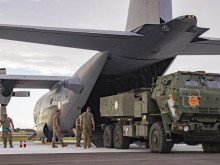A warning signal to the overregulated European civilization: shortage of artillery ammunition not only for Ukraine
The shortage of artillery ammunition for Ukraine has been addressed by the highest European leaders in recent weeks. The European states' own stocks are getting dangerously thin. The question arises as to why we have not prepared for this situation in the more than a year since the start of the Russian invasion of Ukraine and why ammunition production in EU Member States is not running at full speed.
Civilization life cycle theorists speak of the collapse of civilization as a radical simplification of the existing system. A civilisation whose complexity no longer makes it possible, among other things, to respond adequately to the challenges of its environment, collapses in on itself and is replaced by another social system that is simpler and more viable.
 Picture: 120mm howitzer D-30 near Bakhmut | Mykhailo Palinchak
Picture: 120mm howitzer D-30 near Bakhmut | Mykhailo Palinchak
If societies want to avoid collapse, or at least delay it as much as possible, they must be able to keep their internal complexity – especially in the form of the complexity and costliness of the demands placed on their members – within certain limits. And when a critical function of society fails, especially in the face of a specific external threat, this should be a clear warning signal to the civilization in question. Indeed, it could well be the last.

European civilisation is currently receiving a warning signal in the form of a growing shortage of artillery ammunition in particular, which must absolutely be supplied to Ukraine in order to launch and sustain for the necessary time the long-announced offensive against the Russian aggressor.
The ammunition that the European members of NATO had in stockpiles has already been delivered in substantial part to the Ukrainian armed forces, and the remaining stockpiles are no longer very willing to be provided by these states, which consider them to be the minimum necessary for their own defence.
There is currently a discussion at EU level about an EU support mechanism that would encourage Member States to supply the necessary ammunition to the Ukrainians from their own depots and, if necessary, to procure it outside the EU. An agreement along these lines is likely to pass, because – and yes, this is a vulgar oversimplification, but really only a bit – it is basically just a question of how much money and how the EU will send to the Member States for the ammunition they supply. And subsidies, accounting and controlling, the European institutions can do that, as even the most die-hard Eurosceptic must admit.
The problem, however, is that once such a rapid transfer of stockpiled or hastily purchased ammunition from third countries takes place, the Europeans and Ukrainians will be back in a very similar situation to before, only the stockpiles will be considerably emptier. And in order to refill them, or at least to maintain vital supplies to Ukraine, European industry will need to be able to produce sufficient ammunition itself. There are some discussions at EU level in this regard too, but unlike joint purchases, there does not seem to be a meaningful agreement.
However, even an accelerated agreement at the highest EU level today will not provide an immediate solution to the problem of the shortage of large-calibre ammunition. Political will and its symbolic expression is one thing, existing production capacity is another, and the rapid availability of sufficient material inputs is yet another. Alongside this, however, there is also the regulatory system that has been built up over many years and which has been very effective in preventing the production of arms and ammunition.
Regulation undermining production capabilities
Even Daniel Kroupa noted in a recent commentary for Czech Radio Plus that the EU's taxonomy for sustainable finance makes working with financial resources and flows in the arms industry environment very complicated. But even the taxonomy is only one piece of the puzzle – the production of weapons technology is similarly undermined by myriad other regulations. Their stated goals are also lofty values such as sustainability or a healthy environment, but while their success in achieving these goals is questionable at best, the direct and indirect effect of undermining manufacturing capabilities is unfortunately very clear. And the production of weapon systems and munitions should not be outsourced to China or India, as is the case with most other technologies that do not seem sufficiently salonfähig for a future Europe.
One of the critical problems is, for example, the European regulation on chemicals known as REACH, which fundamentally complicates the production of explosives and may well cause shortages in the future, not only for artillery but also for small arms ammunition, if the proposals already tabled to ban the use of lead go through. Yet the example of REACH also shows another aspect of the European system, namely the highly developed doublethink. REACH does not apply to the area of national defence (and this exemption is also burdened with a completely self-serving administrative burden). It is therefore common to encounter the idea that this is settled, since for military purposes there is no need to take into account the restrictions imposed by REACH.
But this is a similar cognitive (and therefore political) fallacy to the rhetorical distinction between defensive and offensive weapons or lethal and non-lethal military material. European industrial production is overwhelmingly civilian, both in the sense that the actors operating in the market are mostly private companies, but above all in the sense that their production is largely directed at the civilian market. Moreover, this is also somewhat counter-intuitively the case for most technologies that otherwise also find use in the defence sector. If the same technology is banned for the civilian sector, it is often no longer worth producing solely for military purposes. To pretend that we will keep bad and dirty technologies only for the very exceptional situation of military defence means that when such an exceptional situation arises, we will not have those technologies.
In five minutes to twelve
Fortunately, Europe is in a situation where there are still some necessary arms industry production capacities and, in particular, there is still a certain level of necessary know-how. In order to be able to support Ukraine to an adequate extent in the foreseeable future and, in the medium and longer term, to be able to defend ourselves as a Western civilisation, it will be necessary to dismantle much of the Kafkaesque complexity that we have created for ourselves - with the noblest of intentions, of course. This will require both that we abolish some of the irrational regulations, but also that we are able to free our morality from Krasnodian hypocrisy.
If our system can be simplified in this way, we can still avoid a civilizational collapse quite gracefully, and we will be able to thank providence for the lesson that the Ukrainian war has taught us. Hail Ukraine.


















